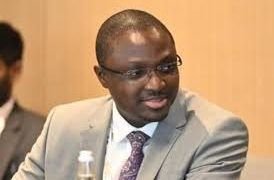Ghana’s Corruption Entrenched by Moral Duality and Institutional Distrust – Prof Bawole
Dean of the University of Ghana Business School (UGBS), Professor Justice Nyigmah Bawole, has linked the country’s entrenched corruption and stalled development to what he described as the “moral duality” of the African persona and widespread distrust in state institutions.
Speaking at his inaugural lecture titled “Our Corruption, Our Ethics, Our Public Administration: Wicked Citizens, Wicked Problems, and Stagnating Development” on Thursday, July 10, 2025, Prof Bawole provided a socio-theoretical explanation for Ghana’s persistent governance and accountability challenges.
He cited Nigerian political scientist Peter Ekeh’s “two publics” theory as a foundational framework for understanding citizens’ inconsistent ethical behavior in private versus public spaces.
“The duality of the African persona refers to the simultaneous existence of contrasting moral and behavioral orientations within the same individual, shaped by the complex interplay between traditional African values and colonial and post-colonial state systems,” he stated.
According to Prof Bawole, citizens in Africa often exhibit high moral standards within their familial and communal networks, which Prof Ekeh termed the “primordial public,” but behave corruptly and unethically in dealings with the state, which he termed as the “civic public,” which is associated with colonial-era bureaucracy and weak institutional legitimacy.
Compartmentalised Ethics and Nation Building
The Dean explained that this duality leads to what he described as “compartmentalized ethics,” where citizens switch between ethical and unethical behavior depending on the domain in which they operate, contributing to a fragmented national identity and weak public trust in governance systems.
“In this space [the civic public], individuals often act with impunity, seek personal gain and show little allegiance to the collective good,” he noted. “This explains why individuals who are highly ethical and generous within their families or clans may engage in corrupt practices when dealing with government institutions.”
He also referenced the work of Professor Geert Hofstede, whose research on cultural dimensions places African societies within the framework of collectivism. In such societies, individuals prioritise loyalty to family or ethnic groups, often to the detriment of national allegiance.
Prof Bawole further used a football metaphor to illustrate the layered collectives Africans retreat into: “If Ghana was playing today against Argentina, all of us Ghanaians would identify as a collective to support Ghana. But if it’s a match between Kotoko and Hearts of Oak, we immediately recoil into our nearest collective.”
Redefining Corruption as Ethical Erosion
Addressing the concept of corruption, Prof Bawole offered a more expansive definition that goes beyond the traditional notion of abuse of entrusted power.
“I define corruption as the decay of the shared moral fabric of society, a collapse in the generally accepted norms of right and wrong, which is not merely perpetuated by a few bad actors but exploited by all who find advantage in the system’s ethical erosion,” he said.
He described corruption in Ghana as a “moral convenience” that pervades daily life from bribery in public offices to societal silence in the face of wrongdoing, and warned that it has become both the cause and the effect of the country’s institutional dysfunction.
Corruption Trends Worsening, Survey Data Shows
Citing data from Afrobarometer and Transparency International, Prof Bawole highlighted the rising public perception of corruption in Ghana.
According to the 2024 Afrobarometer survey, 74% of Ghanaians believe corruption has increased either “somewhat” or “a lot.” Ghana’s performance on the Corruption Perception Index (CPI) has also remained stagnant, with the country failing to cross the 50-point mark on a scale where 100 represents a clean public sector.
“From 2012, Ghana has never recorded a CPI score of 50 or above. The trend shows stagnation, not progress,” he lamented, adding that these statistics underscore the need for deeper ethical reform beyond institutional or legal remedies.
Call for Ethical Leadership and Cultural Reorientation
Prof Bawole noted that while technocratic solutions and institutional reforms are important, they are insufficient in the absence of a broad cultural and ethical reawakening.
“Corruption is our daily reality, our administrative inheritance, and tragically, our moral convenience. Institutions without integrity, policies without legitimacy, and reforms without public trust do not create change,” he emphasized.
He called on both the citizenry and leadership to confront the dual moral standards that undermine national development and to collectively rebuild the moral fabric of the Ghanaian society.








